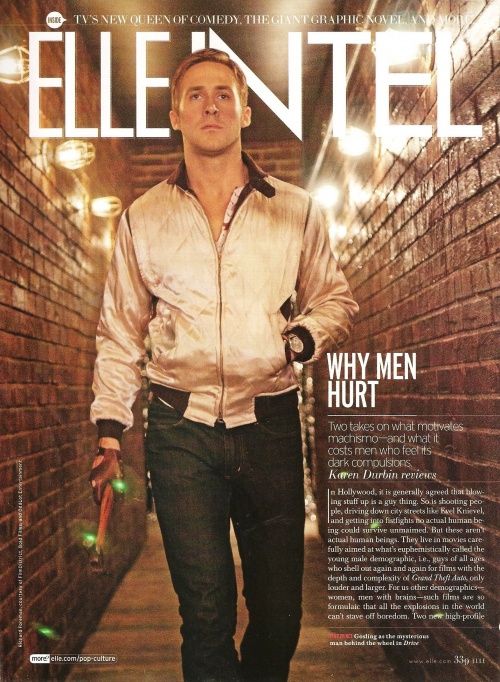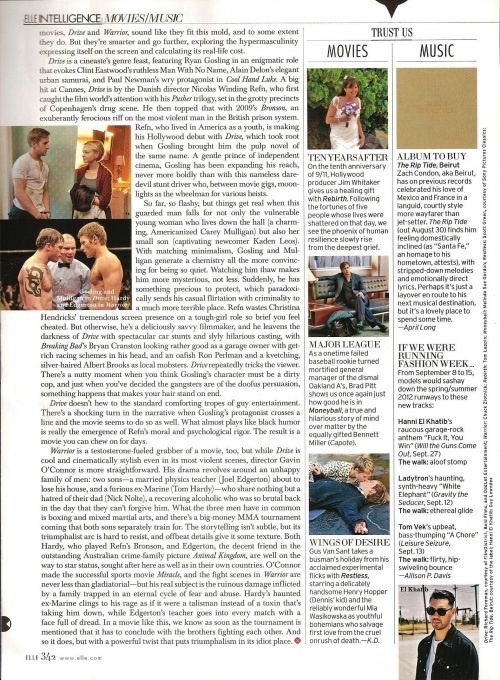Why Men Hurt - Elle - 2011 (September)
This article is from the magazine Elle, dated September 2011, featuring Ryan Gosling.
The high-res magazine scans are from Bryn.
Why Men Hurt
Two takes on what motivates machismo - and what it costs men who feel its dark compulsions.
Karen Durbin reviews
In Hollywood, it is generally agreed that blowing stuff up is a guy thing. So is shooting people, driving down city streets like Evel Knievel, and getting into fistfights no actual human being could survive unmaimed. But these aren't actual human beings. They live in movies carefully aimed at what's euphemistically called the young male demographic, i.e., guys of all ages who shell out again and again for films with the depth and complexity of Grand Theft Auto, only louder and larger. For us other demographics—women, men with brains—such films are so formulaic that all the explosions in the world can't stave off boredom. Two new high-profile movies, Drive and Warrior, sound like they fit this mold, and to some extent they do. But they're smarter and go further, exploring the hypermasculinity expressing itself on the screen and calculating its real-life cost.
Drive is a cineaste's genre feast, featuring Ryan Gosling in an enigmatic role that evokes Clint Eastwood's ruthless Man With No Name, Alain Delon's elegant urban samurai, and Paul Newman's wry protagonist in Cool Hand Luke. A big hit at Cannes, Drive is by the Danish director Nicolas Winding Refn, who first caught the film world's attention with his Pusher trilogy, set in the grotty precincts of Copenhagen's drug scene. He then topped that with 2009's Bronson, an exuberantly ferocious riff on the most violent man in the British prison system. Refn, who lived in America as a youth, is making his Hollywood debut with Drive, which took root when Gosling brought him the pulp novel of the same name. A gentle prince of independent cinema, Gosling has been expanding his reach, never more boldly than with this nameless daredevil stunt driver who, between movie gigs, moonlights as the wheelman for various heists.
So far, so flashy, but things get real when this guarded man falls for not only the vulnerable young woman who lives down the hall (a charming, Americanized Carey Mulligan) but also her small son (captivating newcomer Kaden Leos). With matching minimalism, Gosling and Mulligan generate a chemistry all the more convincing for being so quiet. Watching him thaw makes him more mysterious, not less. Suddenly, he has something precious to protect, which paradoxically sends his casual flirtation with criminality to a much more terrible place. Refn wastes Christina Hendricks' tremendous screen presence on a tough-girl role so brief you feel cheated. But otherwise, he's a deliciously savvy filmmaker, and he leavens the darkness of Drive with spectacular car stunts and slyly hilarious casting, with Breaking Bad's Bryan Cranston looking rather good as a garage owner with get-rich racing schemes in his head, and an oafish Ron Perlman and a kvetching, silver-haired Albert Brooks as local mobsters. Drive repeatedly tricks the viewer. There's a nutty moment when you think Gosling's character must be a dirty cop, and just when you've decided the gangsters are of the doofus persuasion, something happens that makes your hair stand on end.
Drive doesn't hew to the standard comforting tropes of guy entertainment. There's a shocking turn in the narrative when Gosling's protagonist crosses a line and the movie seems to do so as well. What almost plays like black humor is really the emergence of Refn's moral and psychological rigor. The result is a movie you can chew on for days.
Warrior is a testosterone-fueled grabber of a movie, too, but while Drive is cool and cinematically stylish even in its most violent scenes, director Gavin O'Connor is more straightforward. His drama revolves around an unhappy family of men: two sons—a married physics teacher (Joel Edgerton) about to lose his house, and a furious ex-Marine (Tom Hardy)—who share nothing but a hatred of their dad (Nick Nolte), a recovering alcoholic who was so brutal back in the day that they can't forgive him. What the three men have in common is boxing and mixed martial arts, and there's a big-money MMA tournament coming that both sons separately train for. The storytelling isn't subtle, but its triumphalist arc is hard to resist, and offbeat details give it some texture. Both Hardy, who played Refn's Bronson, and Edgerton, the decent friend in the outstanding Australian crime-family picture Animal Kingdom, are well on the way to star status, sought after here as well as in their own countries. O'Connor made the successful sports movie Miracle, and the fight scenes in Warrior are never less than gladiatorial—but his real subject is the ruinous damage inflicted by a family trapped in an eternal cycle of fear and abuse. Hardy's haunted ex-Marine clings to his rage as if it were a talisman instead of a toxin that's taking him down, while Edgerton's teacher goes into every match with a face full of dread. In a movie like this, we know as soon as the tournament is mentioned that it has to conclude with the brothers fighting each other. And so it does, but with a powerful twist that puts triumphalism in its idiot place.

